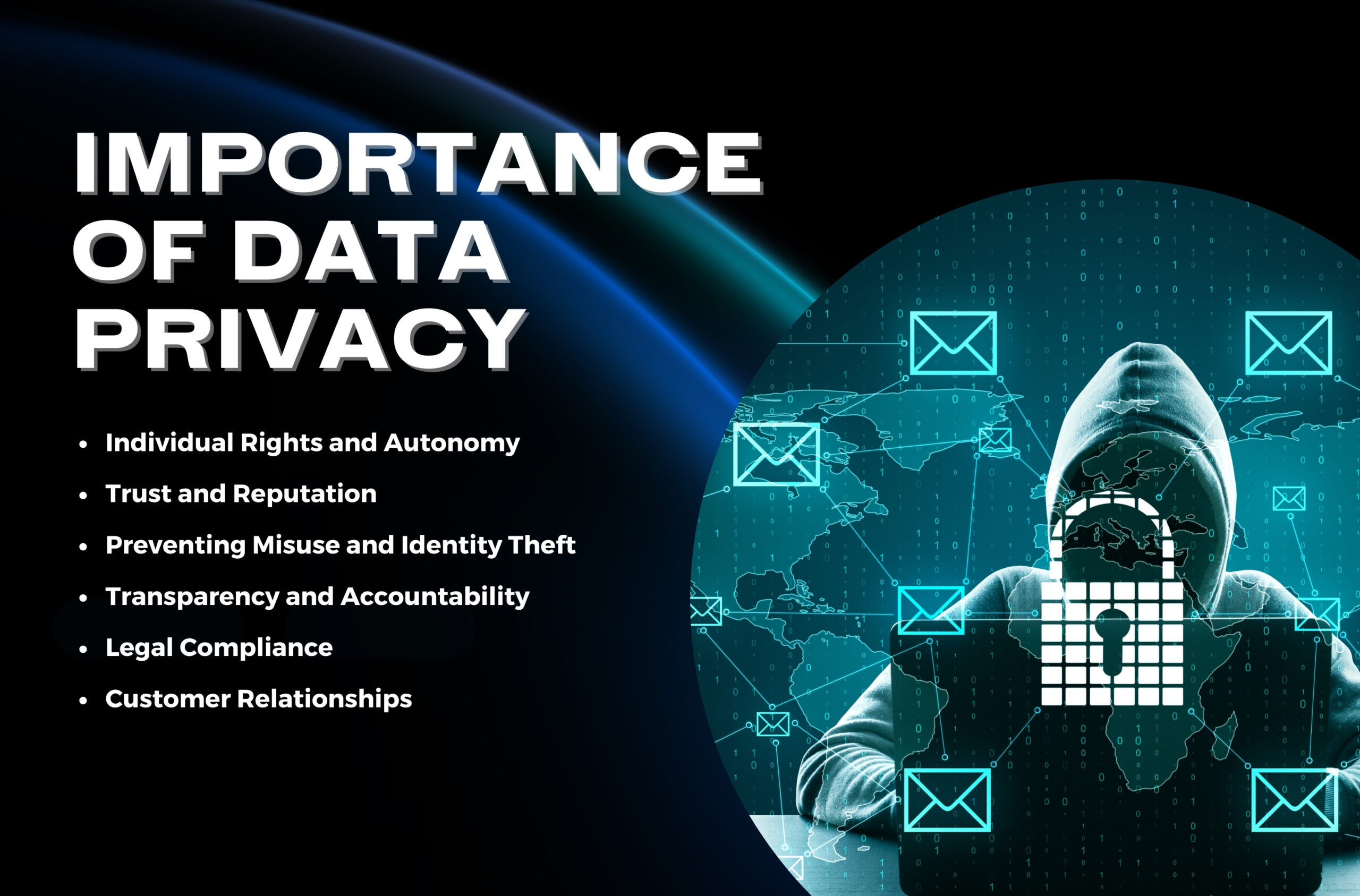Data privacy refers to the protection of an individual’s personal information or data, ensuring that it is collected, processed, stored, and used in a way that respects their rights and maintains confidentiality. It involves controlling access to personal data, determining how that data is used, and safeguarding it against unauthorized access or misuse.
Data privacy is a fundamental aspect of maintaining individuals’ autonomy over their personal information and preventing its misuse for purposes they haven’t consented to. It encompasses legal, ethical, and technical considerations to ensure that individuals’ sensitive information remains secure and is handled responsibly and transparently.
Contents
Importance of Data Privacy

Data privacy is important for several reasons:
1. Individual Rights and Autonomy:
Data privacy is a fundamental human right. It empowers individuals to have control over their personal information, allowing them to make informed decisions about how their data is collected, used, and shared.
2. Trust and Reputation:
Businesses that prioritize data privacy build trust with their customers. When individuals believe their data is handled responsibly, they are more likely to engage with and support those organizations, leading to a positive brand reputation.
3. Preventing Misuse and Identity Theft:
Personal data can be misused for various purposes, including identity theft, financial fraud, and cybercrime. Strong data privacy measures help prevent such malicious activities and protect individuals from harm.
4. Transparency and Accountability:
Demonstrating transparency in data handling practices helps organizations be accountable for their actions. When data practices are clear, individuals can hold organizations responsible for any mishandling.
5. Legal Compliance:
Many regions have stringent data protection laws, such as the General Data Protection Regulation (GDPR) in the EU or the California Consumer Privacy Act (CCPA) in the US. Organizations that don’t comply with these laws can face severe legal penalties.
- Customer Relationships:
Respecting data privacy enhances customer relationships. When individuals feel that their privacy is respected, they are more likely to provide accurate information and engage more willingly with marketing and other interactions.
Best Practices for Data Privacy in Marketing
- Transparency: Be upfront about data collection practices. Maintain a clear and concise privacy policy that outlines data usage, sharing practices, and user rights.
- Minimal Data Collection: Collect only the data necessary for your marketing objectives. Avoid gathering excessive information that isn’t relevant to your campaigns.
- Secure Storage: Invest in robust cybersecurity measures to protect stored data from breaches. Encryption and regular security audits are essential.
- Anonymization: Whenever possible, use anonymized data for analysis and decision-making. This way, individual identities remain protected.
- User Control: Provide users with the ability to manage their preferences and the data they share. Make it easy for them to opt out of data collection.
- Consent Mechanisms: Implement clear and easily understandable consent mechanisms. Obtain explicit consent before collecting sensitive information.
- Training: Educate your marketing and data handling teams about data privacy best practices. Everyone involved should understand their role in maintaining privacy.
Challenges in Data Privacy
- Consent and Transparency: Obtaining informed consent from users for data collection and usage is a challenge. Businesses must communicate clearly about what data is collected, and how it will be used, and provide users with the choice to opt out.
- Data Breaches: Cybersecurity threats loom large. A data breach can expose sensitive customer information, resulting in financial loss and reputational damage.
- Third-Party Sharing: Many marketing efforts involve sharing data with third-party partners. Ensuring these partners adhere to the same privacy standards can be complex.
- Global Regulations: Data privacy laws such as GDPR and CCPA have a global impact. Businesses must navigate a complex web of regulations when dealing with international customers.
The Significance of Data Privacy in Marketing
Data is the lifeblood of modern marketing. It enables companies to craft tailored campaigns, deliver relevant content, and anticipate customer needs. However, the misuse of personal data can erode trust and damage a brand’s reputation. Respecting data privacy isn’t just a legal obligation; it’s a fundamental aspect of ethical business conduct.
The Path Forward
- Ethical Culture: Foster an organizational culture that values and prioritizes data privacy. This commitment should come from the top down.
- Continuous Compliance: Stay informed about evolving data privacy regulations. Regularly update your practices to remain compliant with new laws.
- Data Protection Officer (DPO): Appoint a DPO responsible for overseeing data privacy practices and ensuring alignment with regulations.
- Innovation and Privacy: As technology advances, find innovative ways to deliver personalized experiences without compromising privacy. Explore techniques like differential privacy.
Conclusion
Data privacy is no longer a niche concern – it’s an integral aspect of responsible marketing. Businesses that prioritize data privacy not only comply with legal requirements but also earn the trust and loyalty of their customers. By adopting transparent practices, minimizing data collection, and continually educating their teams, companies can navigate the complex landscape of data privacy in marketing. As the digital landscape evolves, maintaining ethical data privacy practices will be an ongoing journey, essential for building lasting customer relationships in a data-driven world.
Frequently Asked Questions (FAQs)
- Why is Data Privacy important in marketing?
Data privacy is crucial in marketing to build trust with customers, comply with legal requirements, and protect individuals’ sensitive information from misuse or data breaches.
- What is the role of a privacy policy in marketing?
A privacy policy is a legal document that outlines how a company collects, uses, and protects personal data. It’s essential in marketing to inform customers about data practices.
- What is data privacy in marketing?
Data privacy in marketing refers to the responsible and ethical handling of personal information collected from individuals during marketing activities. It involves ensuring that individuals’ data is used, stored, and protected in compliance with relevant privacy laws and regulations.
- Is it possible to personalize marketing while respecting data privacy?
Yes, it is possible. You can personalize marketing efforts by using anonymized data or obtaining explicit consent from individuals to use their data for personalization.


